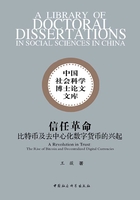
Abstract
“Bitcoin” —the first “decentralized digital currency” in human history—has became a global phenomenon in recent years.For any monetary system to perform its socio-economic functions,it must be underpinned by trust.Therefore,money can be seen as a distinct manifestation of system trust;a revolution in the form of money essentially reflects a revolution in trust.Based on a case study of Bitcoin,this research aims to understand how this new type of monetary system,with neither physical form nor government endorsement,is able to gain people's trust worldwide with a completely novel approach,and how the rise of Bitcoin and decentralized digital currencies signifies a new model of system trust forming in the Information Age.
As an extremely innovative conception of money,the rise of Bitcoin demonstrates the widespread socio-economic impacts that the information technology revolution has on society.As Bitcoin gains global attention,the academic literature on the digital currency is rapidly growing;yet,the literature mainly involves the fields of computer science,economics,finance and regulatory science.However,without systematic analysis from the sociological perspective,our understanding of the essence of this global phenomenon and its far-reaching social implications are fundamentally limited.The objective of this study is to conduct an exploratory research on Bitcoin's trust model using a sociological approach to show that,rather than Bitcoin's technological and monetary revolution,it is the revolution in trust that is the most fundamental social change behind this bewildering phenomenon.
Since 2013,the author has conducted a qualitative research on Bitcoin's trust model through participant observation,literature analysis,and in-depth interviews.Based on the theoretical perspectives in “sociology of money” and “theories of trust”,the author constructed an analytical framework consisting of three dimensions:institutional,functional,and cultural.The purpose of this framework is to understand how Bitcoin,with modern information and network technologies,is able to deconstruct and reconstruct system trust based on a series of institutional innovations,functional mechanisms,and cultural influences;and to understand how this new monetary system is replacing the “centralized trust model” behind the traditional currencies and forming a “distributed trust model” in the Information Age.
The research shows that as the information technology revolution continues to disrupt the foundations of system trust formed in the traditional society,trust has become an increasingly expensive social resource,catalyzing a widespread trust crisis around the world.With the backdrop of increasing time-space distanciation and the deterioration of tranditional system trust in the Information Age,Bitcoin—a digital currency born on the internet based on “distributed communication technologies” —is able to reconstruct the basis of system trust in the network society with disruptive forces on the institutional,functional,and cultural levels.
At the institutional level,based on cryptography and computer technology,Bitcoin constructs its institutional framework,consensus mechanism,and incentive system centered around “code” and “algorithm,” allowing strangers on the Internet to form reliable expectations and consensus regarding digital transactions without any authority acting as a trusted-third-party.Institutional innovations based on technological advancements enabled Bitcoin to transcend the limitations of regional institutions to gain people's trust in the global digital network.
On the functional level,with the blockchain technology,Bitcoin is trusted for its security,authenticity,and marketability as a digital currency system.The operation of Bitcoin depends on an “automation system,” a “self-organized network,” and a “self-motivated group,” which set the stage for new forms of socio-economic activities in the cyberspace.On a more general level,Bitcoin gains people's trust with its ability to digitalize systematic order,to optimize through open dialogue,and to monetize innovative resources.By enabling new socio-economic functions in cyberspace,a new socio-economic platform is developed together with a new form of social trust,which needs to be continuously activated and renewed through exchanges and interactions.
On the cultural level,the research focuses on the developements of “technology-culture,” “counter-culture,” “virtual-culture,” and “anonymity-culture” to discuss the cultural genes of Bitcoin.Bitcoin is a system of symbols that carries specific symbolic values of the Information Age.By conveying meaning and identity through Bitcoin's symbolic system,a “network community” can develop outside the boundaries of the traditional society,which forms the cultural and moral foundations of general trust among its members.Through the interplay of a “technological revolution” and a “cultural revolution,”a distributed trust model is emerging in Bitcoin's distributed communities over the Internet,replacing the centralized trust model behind national money,and driving a “trust revolution” in the Information Age.
This study discusses how the distributed trust model of Bitcoin based on blockchain technology can help to reduce the cost of building trust as well as improve and extend system trust in certain scenarios.It should be emphasized that within the institutional-functional-cultural framework,the distributed trust model has its own limitations that are difficult to overcome and cannot deal with the complicated trust issues of the real world on its own.Meanwhile,as the new trust model continues to impact the existing social structure,new problems,conflicts,and challenges will be created by the contradictory forces of the “old” and “new” systems.
Social trust is a dynamic process,and every trust model has its own scope and limitations.Through a case study of Bitcoin,this research shows that in the digital world shaped by information and network technologies,social trust can be transformed and reconstructed through active,reflective,and continuous social innovation.In conclusion,this study stresses that the distributed trust model formed in cyberspace needs to be integrated with the traditional trust models to build a multi-dimensional system of trust,to extend the range and depth of modern society as a whole.
Key words:Social trust;Bitcoin;Decentralized digital currency;Blockchain;Distributed trust